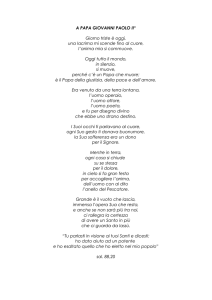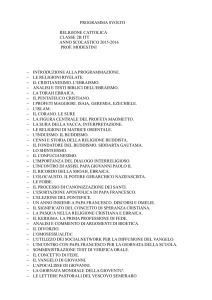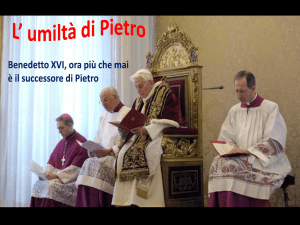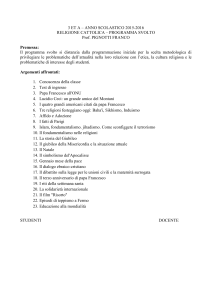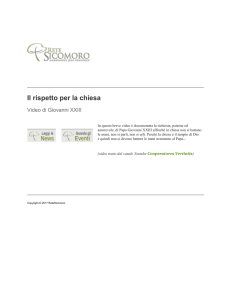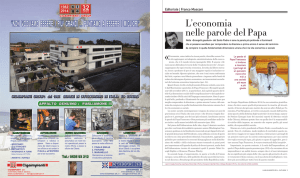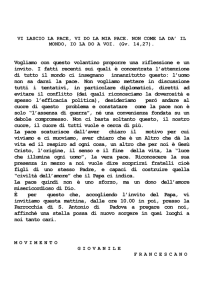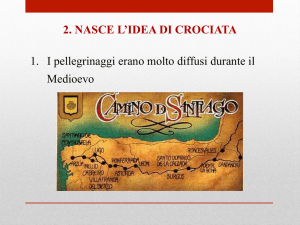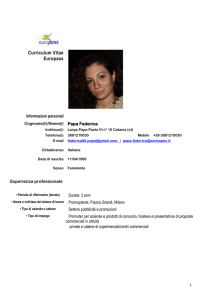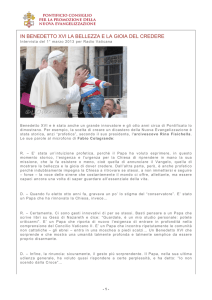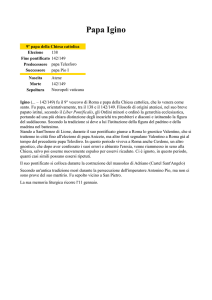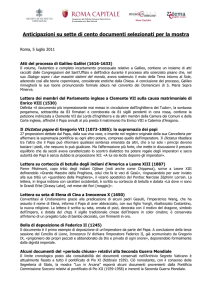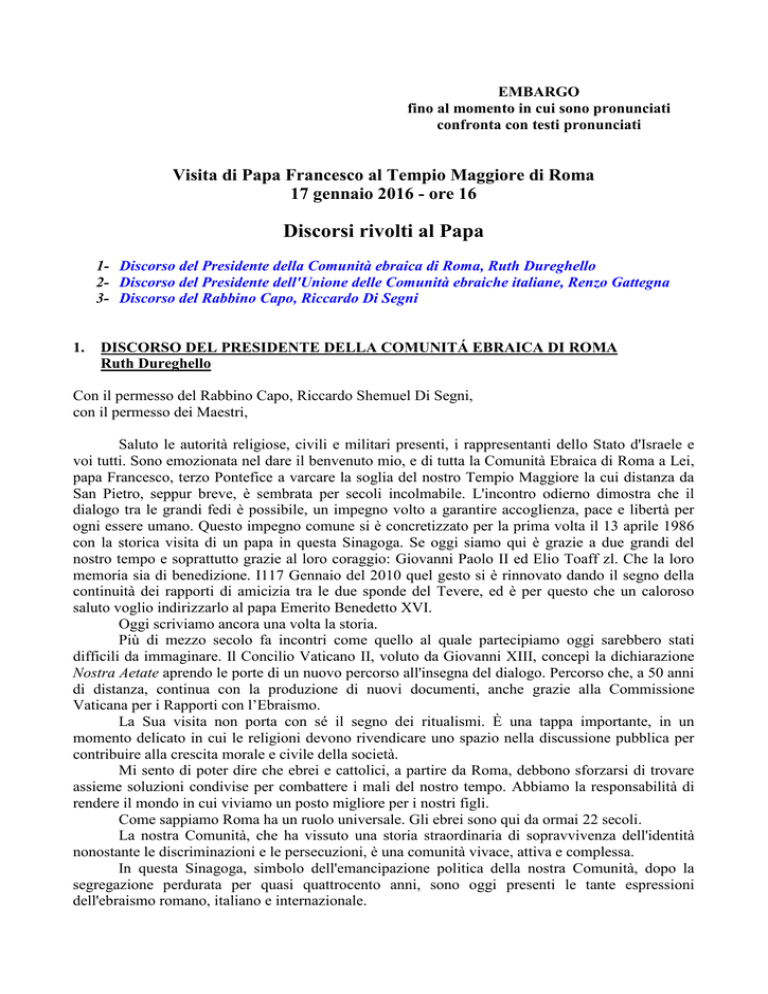
EMBARGO
fino al momento in cui sono pronunciati
confronta con testi pronunciati
Visita di Papa Francesco al Tempio Maggiore di Roma
17 gennaio 2016 - ore 16
Discorsi rivolti al Papa
1- Discorso del Presidente della Comunità ebraica di Roma, Ruth Dureghello
2- Discorso del Presidente dell'Unione delle Comunità ebraiche italiane, Renzo Gattegna
3- Discorso del Rabbino Capo, Riccardo Di Segni
1.
DISCORSO DEL PRESIDENTE DELLA COMUNITÁ EBRAICA DI ROMA
Ruth Dureghello
Con il permesso del Rabbino Capo, Riccardo Shemuel Di Segni,
con il permesso dei Maestri,
Saluto le autorità religiose, civili e militari presenti, i rappresentanti dello Stato d'Israele e
voi tutti. Sono emozionata nel dare il benvenuto mio, e di tutta la Comunità Ebraica di Roma a Lei,
papa Francesco, terzo Pontefice a varcare la soglia del nostro Tempio Maggiore la cui distanza da
San Pietro, seppur breve, è sembrata per secoli incolmabile. L'incontro odierno dimostra che il
dialogo tra le grandi fedi è possibile, un impegno volto a garantire accoglienza, pace e libertà per
ogni essere umano. Questo impegno comune si è concretizzato per la prima volta il 13 aprile 1986
con la storica visita di un papa in questa Sinagoga. Se oggi siamo qui è grazie a due grandi del
nostro tempo e soprattutto grazie al loro coraggio: Giovanni Paolo II ed Elio Toaff zl. Che la loro
memoria sia di benedizione. I117 Gennaio del 2010 quel gesto si è rinnovato dando il segno della
continuità dei rapporti di amicizia tra le due sponde del Tevere, ed è per questo che un caloroso
saluto voglio indirizzarlo al papa Emerito Benedetto XVI.
Oggi scriviamo ancora una volta la storia.
Più di mezzo secolo fa incontri come quello al quale partecipiamo oggi sarebbero stati
difficili da immaginare. Il Concilio Vaticano II, voluto da Giovanni XIII, concepì la dichiarazione
Nostra Aetate aprendo le porte di un nuovo percorso all'insegna del dialogo. Percorso che, a 50 anni
di distanza, continua con la produzione di nuovi documenti, anche grazie alla Commissione
Vaticana per i Rapporti con l’Ebraismo.
La Sua visita non porta con sé il segno dei ritualismi. È una tappa importante, in un
momento delicato in cui le religioni devono rivendicare uno spazio nella discussione pubblica per
contribuire alla crescita morale e civile della società.
Mi sento di poter dire che ebrei e cattolici, a partire da Roma, debbono sforzarsi di trovare
assieme soluzioni condivise per combattere i mali del nostro tempo. Abbiamo la responsabilità di
rendere il mondo in cui viviamo un posto migliore per i nostri figli.
Come sappiamo Roma ha un ruolo universale. Gli ebrei sono qui da ormai 22 secoli.
La nostra Comunità, che ha vissuto una storia straordinaria di sopravvivenza dell'identità
nonostante le discriminazioni e le persecuzioni, è una comunità vivace, attiva e complessa.
In questa Sinagoga, simbolo dell'emancipazione politica della nostra Comunità, dopo la
segregazione perdurata per quasi quattrocento anni, sono oggi presenti le tante espressioni
dell'ebraismo romano, italiano e internazionale.
Gli Enti Ebraici sono istituzioni con radici antiche e tradizioni solide che rappresentano un
ebraismo impegnato, nei secoli, al sostegno dei bisognosi, alla cura dei malati e degli anziani e,
soprattutto, all'educazione dei figli e delle nuove generazioni. Persone, nella stragrande
maggioranza volontari, che lavorano ogni giorno silenziosamente, con o senza ruoli ufficiali, per
tenere viva una Comunità che è il mio più grande orgoglio ed è un grande orgoglio per tutta la città.
Lei, papa Francesco, ha dimostrato da sempre un'amicizia con il mondo ebraico.
Dall'Argentina ha portato con sé un bagaglio di rapporti saldi con l'Ebraismo, ribaditi fin dai primi
atti del suo pontificato. Voglio ricordare due momenti in cui mi sono sentita particolarmente toccata
dalle sue parole. Il primo, quando, durante la visita della delegazione di questa Comunità in
Vaticano, l'11 ottobre del 2013, al quale ho avuto l'onore di partecipare, Lei si è rivolto al nostro
Rabbino Capo dicendo che "un cristiano non può essere antisemita. L'antisemitismo sia bandito dal
cuore e dalla vita di ogni uomo e di ogni donna". Il secondo, quando incontrando poche settimane fa
il Presidente del World Jewish Congress, ha detto che "attaccare gli ebrei è antisemitismo, ma anche
un attacco deliberato a Israele è antisemitismo". Lo ribadisco perché questa Comunità, come tutte le
comunità ebraiche nel mondo, ha un rapporto identitario con Israele. Siamo italiani, profondamente
orgogliosi di esserlo e allo stesso tempo siamo parte del Popolo di Israele.
È attraverso le sue parole che riaffermo con forza che l'antisionismo è la forma più moderna
di antisemitismo
Il Suo viaggio in Israele, e nella sua capitale Gerusalemme, è stato un atto per noi
importante. Anche in quell'occasione Lei ha usato parole di profondo rispetto per lo Stato Ebraico
auspicando che possa vivere in pace e sicurezza.
Per vedere tutto questo realizzato, dobbiamo ricordare che la pace non si conquista
seminando il terrore con i coltelli in mano, non si conquista versando sangue nelle strade di
Gerusalemme, di Tel Aviv, di Ytamar, di Beth Shemesh e di Sderot. Non si conquista scavando
tunnel, non si conquista lanciando missili. Possiamo affrontare un processo di pace contando i morti
del terrorismo? No. Tutti noi dobbiamo dire al terrorismo di fermarsi. Non solo al terrorismo di
Madrid, di Londra, di Bruxelles e di Parigi, ma anche a quello che colpisce ormai tutti i giorni
Israele. Il terrorismo non ha mai giustificazione.
La lezione dell'odio che porta solo morte è davanti agli occhi di tutti. Lo insegna la storia
recente e quella meno recente. Lo ha visto Lei con i suoi occhi a Buenos Aires che ha conosciuto il
terrore antisemita il 18 luglio del 1994: ottantacinque morti e oltre duecento feriti.
Molti si chiedono se il terrorismo islamico colpirà mai Roma. Signori, Roma è già stata
colpita. Un solo nome: Stefano Gaj Taché z.l, due anni, 9 ottobre 1982, ucciso da un commando di
terroristi palestinesi. Ringrazio il Presidente della Repubblica, Sergio Mattarella, per aver onorato la
memoria del piccolo Stefano ricordandolo nel suo discorso d'insediamento a Camere riunite e il
Presidente Giorgio Napolitano per averlo inserito tra le vittime italiane del terrorismo.
L'odio che nasce dal razzismo e trova il suo fondamento nel pregiudizio o peggio usa le
parole ed il nome di Dio per uccidere, merita sempre il nostro sdegno e la nostra fede una condanna.
Papa Francesco, oggi abbiamo una grande responsabilità di fronte al mondo. Di fronte al
sangue sparso dal terrore in Europa e in Medio Oriente, di fronte al sangue dei cristiani perseguitati
e agli attentati perpetrati contro civili inermi anche all'interno dello stesso mondo arabo, di fronte
agli orrendi crimini compiuti contro le donne. Non possiamo essere spettatori. Non possiamo restare
indifferenti. Non possiamo cadere negli stessi errori del passato, fatto di silenzi assordanti e teste
voltate. Uomini e donne che rimasero immobili davanti a vagoni stipati di ebrei spediti nei forni
crematori. Eccoli, oggi in prima fila i nostri sopravvissuti alla tragedia della Shoah a ricordarci che
la Memoria non è un esercizio di auto-consolazione per riparare agli orrori commessi. La Memoria
del più grande genocidio della Storia dell'Uomo la teniamo viva affinché nulla di simile possa
ripetersi. Questo il nostro impegno più grande per il futuro e per le nuove generazioni.
Con questa visita Ebrei e Cattolici lanciano oggi un messaggio nuovo rispetto alle tragedie
che hanno riempito le cronache degli ultimi mesi.
La Fede non genera odio, la Fede non sparge sangue, la Fede richiama al dialogo.
Una convivenza ispirata all'accoglienza, alla pace e alla libertà in cui si impari a rispettare,
ciascuno con la propria identità, l'altro. Come oggi qui a Roma, così in ogni luogo.
Siamo certi che questa consapevolezza, che non appartiene esclusivamente alle nostre
religioni, possa trovare la collaborazione anche dell'Islam. La nostra speranza è che questo
messaggio giunga ai tanti Musulmani che condividono con noi la responsabilità di migliorare il
mondo in cui viviamo. Insieme possiamo farcela.
Shalom papa Francesco, Shalom a tutti voi.
Traduzione di lavoro in lingua inglese:
SPEECH BY THE PRESIDENT OF THE JEWISH COMMUNITY OF ROME ON THE OCCASION
OF POPE FRANCIS' VISIT TO THE GREAT SYNAGOGUE
by RUTH DUREGHELLO
with the permission of Chief Rabbi, Riccardo Shemuel Di Segni,
and of the Masters,
I would like to welcome the religious, civilian and military authorities present here, the
representatives of the state of Israeli and all of you. I feel moved to welcome Pope Francis on behalf of the
whole Jewish community of Rome, the third Pope to cross the threshold of our Great Synagogue, whose
short distance from St. Peter's has seemd almost impossible to travel for centuries. Today's meeting shows
that the dialogue between great religions is possible. It is a pledge to be open to others and to promote peace
and freedom for each human being. This shared commitment became a reality for the first time on April 13,
1986 with the Pope's historical visit to this Synagogue. We are here today thanks to two great champions of
our time and especially to their courage: John Paul II and Elio Toaff zl. May their memory be a blessing for
all of us. This historical event occurred again on January 17, 2010, thus giving a continuity to the friendly
relationships between the two banks of the Tiber. This is the reason why I want to extend my warmest
greetings to Pope Emeritus Benedict XVI.
Today we are again writing history.
It would have been difficult to imagine having this kind of meeting more than fifty years ago.
Vatican Council II, launched by John XXIII, conceived Nostra Aetate, thus paving the way to a new path
based on dialogue. Fifty years later, this path is still open also thanks to the Vatican Commission for
Religious Relations with the Jews.
Your visit is not in the sign of ritualism. It is an important landmark at a very sensitive time for
religions, which have to claim their space in the public discussion so as to provide their contribution to the
moral and civic growth of society.
I feel I can say that the Jews and the Catholics, starting from Rome, must find together shared
solutions to fight against the evils of our time. We have the responsibility to make the world in which we live
a better place for our children.
As we know, Rome has a universal role. The Jews have been here for over 22 centuries.
Our Community has written an extraordinary story of identity survival notwithstanding
discriminations and persecutions. It is a lively, active and complex community.
Today there are many expressions of Roman, Italian and international Judaism in this Synagogue,
the symbol of the political emancipation of our Community after almost 400 years of segregation.
Jewish institutions have ancient roots and sound traditions and they represent highly committed of
Jewish people who have provided support and care for the needy, the sick and the elderly over the centuries
and, in particular, for the education of their children and for the new generations. In most cases, these people
are volunteers who work every day behind the scenes, with or without official roles, so as to keep alive this
Community, which is the greatest source of pride for me and for the whole city.
You, Pope Francis, have always been a friend of the Jewish world. You have taken with you from
Argentina a sound relationship with the Jewish people, which you have strengthened since the beginning of
your mandate. I want to recall two moments in which I felt particularly touched by your words. The first was
during the visit of a delegation from this Community to the Vatican on October 11 2013, to which I had the
honor to participate. You addressed our chief Rabbi stating “a Christian cannot be anti-Semitic. Let antiSemitism be banned from the heart and the life of each man and woman”. The second was during the
meeting You had a few weeks ago with the President of the World Jewish Congress, when you said that
“attacking the Jews is anti-Semitism, but also a deliberate attack against Israel is anti-Semitism”. I want to
reiterate this concept because this Community, like all the Jewish communities around the world, have an
identity relationship with Israel. We are Italian and we are very proud of being Italian but, at the same time,
we are part of the People of Israel.
It is through Your words that I repeat with determination that anti-Zionism is the most modern form
of anti-Semitism.
Your trip to Israel and to its capital Jerusalem was a very important event for us. On that occasion
too, You used words of profound respect for the Jewish State, hoping that it will be able to live in peace and
security.
In order to make this dream come true, we have to remember that peace cannot be conquered
through stabbing and terror. It cannot be achieved through bloodshed in the streets of Jerusalem, Tel Aviv,
Ytamar, Beth Shemesh and Sderot. It cannot be obtained by digging tunnels nor by launching missiles. Can
we work on the peace process by counting the number of victims of terrorism? No, we can't. We must all
call for a stop to terrorism. Not only the terrorism in Madrid, London, Brussels and Paris, but also the daily
terrorist attacks in Israel. Terrorism is never justified.
The hatred lesson which brings with it is far too evident. This is the lesson that comes from recent
and less recent history. You saw its effects with your eyes in Buenos Aires with the anti-Semitic terrorist
attack on July 18, 1994, which claimed 85 lives and wounded over 200 people.
Many wonder if Islamic terrorism is going to ever hit Rome. Ladies and gentelmen, Rome was
already hit. Just one name: Stefano Gaj Taché z.l, two years of age, on October 9 1982, who was killed by a
commando of Palestinian terrorists. I would like to thank the President of the Italian Republic, Sergio
Mattarella, for his tribute to the memory of little Stefano during his swear-in speech before Parliament and
President Giorgio Napolitano for having included him among the Italian victims of terrorism.
The hatred that comes from racism and bias or worse which uses God's name or words to kill
deserves our contempt and our firm condemnation.
Pope Francis, today we have a great responsibility vis-a-vis the world for the blood shed by terrorists
in Europe and in the Middle East, for the blood of persecuted Christians and for the attacks against unarmed
civilians even within the Arab world, for the heinous crimes against women. We cannot sit and look. We
cannot remain indifferent. We cannot make the same mistakes of the past, when we remained silent and
turned our backs. Men and women who did not do anything when train wagons stuffed with Jewish people
were sent to the crematoriums. Here are in the first row our survivors of the Shoah, who remind us that
Memory is not a self-comforting exercise to repair the horrors of the past. The memory of the greatest
genocide in the history of mankind is kept alive so that nothing similar will happen again. This is our major
commitment for the future and for the new generations.
On the occasion of this visit, today the Jews and the Catholics convey a new message with respect to
the tragedies that have made the news in the last few months.
Faith does not generate hatred. Faith does not shed blood, faith calls for dialogue.
Coexistence should be based on openness towards the others, on peace and freedom, where it is
possible to learn the respect for each other's identity. As we do today here in Rome and in any other place.
We are sure that this awareness, which does not only belong to our religion, will find a collaborative
attitude in the world of Islam. Our hope is that this message will reach the many Muslim people who share
with us the responsibility to improve the world in which we live. We can make it together.
Shalom Pope Francis, Shalom to all of you.
2.
DISCORSO DEL PRESIDENTE DELL'UNIONE DELLE COMUNITÀ EBRAICHE
ITALIANE Renzo Gattegna
Caro papa Francesco,
è con spirito di profonda stima che Le porgo, a nome delle Comunità Ebraiche Italiane, il
più caloroso benvenuto.
Sono consapevole che Lei viene in questo tempio ad incontrare l'ebraismo italiano con il suo
carico di fede e di cultura, di dolore e di vita. Questa sua visita giunge a rinsaldare ancora di più il
cammino di dialogo, di amicizia e di fratellanza tra il popolo ebraico, il popolo dell'Alleanza, e la
Chiesa cattolica.
Questa sua visita segue le due precedenti di papa Giovanni Paolo li nel 1986 e di papa
Benedetto XVI nel 2010, ognuna delle quali ha segnato un innalzamento del livello delle relazioni.
Sono indelebili nella nostra memoria le immagini dello storico abbraccio che trent'anni fa, il 13
aprile 1986, vide uniti papa Giovanni Paolo li e il Rav Elio Toaff. Ero presente e vidi con i miei
occhi le loro figure avvicinarsi l'una all'altra, stringersi prima le mani e poi lasciarsi andare in quel
gesto, uno appoggiato all'altro, come per sostenersi a vicenda e annullare quella distanza che per
secoli era stata incolmabile. Il 17 gennaio 2010 ebbi la fortuna di partecipare personalmente, come
rappresentante delle 21 Comunità ebraiche italiane, alla visita di papa Benedetto XVI, ora come
allora insieme al nostro Rabbino Capo Riccardo Di Segni. Un incontro significativo e ricco di
contenuti, durante il quale il papa ribadì la condivisione delle comuni radici, sulla base delle quali
superare ogni forma di incomprensione e pregiudizio.
I due momenti di incontro sono stati il coronamento e l'ideale prosecuzione di un percorso
non sempre facile, che trova la sua origine e ha avuto una fondamentale svolta positiva con la
promulgazione della Dichiarazione conciliare "Nostra Aetate". Quel passo che 50 anni fa cambiò
radicalmente il rapporto tra la Chiesa cattolica e l'Ebraismo e che per giudizio unanime costituisce
una pietra miliare che segna l'inizio di un dialogo costruttivo, com'è stato largamente condiviso
durante le numerose celebrazioni che si sono svolte negli ultimi mesi per celebrarne il
cinquantenario.
Nella loro diversità, nel reciproco rispetto delle differenti tradizioni, nell'accettazione di una
pari dignità, il rapporto tra la Chiesa cattolica e l'Ebraismo vive da allora un periodo di grande
progresso, che possiamo sicuramente definire di portata storica. Questa nuova era sta avendo negli
anni più recenti una ulteriore accelerazione per suo merito, papa Francesco, e personalmente,
avendo avuto l'onore di incontrarla più volte in questi anni, mi sono reso conto di quanto sia forte il
Suo legame con il mondo ebraico. Nel novembre 2013 fu pubblicata la Sua prima esortazione
apostolica denominata "Evangeli gaudium", nella quale erano contenute delle affermazioni che
tante generazioni di ebrei hanno sperato di sentir pronunciare e della cui importanza non tutti si
sono resi conto: “La conversione che la Chiesa chiede agli idolatri non è applicabile agli ebrei";
"Uno sguardo speciale si rivolge al Popolo ebraico, la cui Alleanza con Dio non è mai stata
revocata, perché i doni e la chiamata di Dio sono irrevocabili"; "La Chiesa considera il Popolo
dell'Alleanza e la sua fede come radice sacra della propria identità cristiana. Come cristiani non
possiamo considerare l'Ebraismo come una religione estranea"; e ancora proseguiva "Dio continua
ad operare nel Popolo dell'Alleanza e fa nascere tesori di saggezza che scaturiscono dal suo incontro
con la Parola Divina". E infine la più recente, che risale al dicembre 2015, attraverso la Pontificia
Commissione per i Rapporti religiosi con l'Ebraismo che afferma: "Il fatto che gli ebrei abbiano
parte nella salvezza di Dio è teologicamente fuori discussione".
Questo panorama innegabilmente positivo non deve indurre alcuno a interrompere il lavoro
per nuovi ulteriori progressi e in particolare ritengo necessario realizzare una strategia comune che
consenta un'ampia diffusione, presso tutta la popolazione, della conoscenza dei grande lavoro svolto
e del consolidamento dei sentimenti di amicizia e fratellanza che fino ad oggi sono rimasti
circoscritti ai vertici religiosi e culturali, mentre ancora circolano con frequenza pregiudizi e
discorsi improntati a un disprezzo che ci offende e ci ferisce. In questo senso riponiamo grande
fiducia nella sua capacità di parlare, di dialogare e di farsi ascoltare dalla comunità dei fedeli, oltre
che dalle gerarchie ecclesiastiche.
Tante volte in passato l'antisemitismo si è nutrito di falsi simboli, creati per diffondere falsi
stereotipi, soprattutto negli strati della popolazione che avevano minor accesso all'istruzione. Si
pensi, tanto per citarne un paio, ai Protocolli dei Savi di Sion e al culto del Simonino. La Chiesa
cattolica è sempre stata attenta e consapevole dell'importanza dei simboli, e Lei, caro papa
Francesco, ha mostrato una grande virtù: la capacità di diffondere, in maniera virtuosa, messaggi
importanti e complessi in modo apparentemente semplice, proprio attraverso la forza dei simboli e
dei gesti simbolici.
Lanciando uno sguardo al panorama internazionale appare chiaro che in questo difficile
momento cristiani ed ebrei sono accomunati dallo stesso destino, come da Lei ricordato sia nel
corso dei suo viaggio in Israele, sia nelle occasioni in cui ha avuto modo di incontrare il presidente
Shimon Peres e il presidente Reuven Rivlin. Cristiani ed Ebrei sono costretti a difendersi da spietati
nemici, violenti e intolleranti, che stanno usando il nome di Dio per spargere il terrore compiendo i
più atroci crimini contro l'umanità. La salvezza per tutti può venire solo dalla formazione di una
forte coalizione che sia in grado di vincere questa sfida camminando fianco a fianco, nel rispetto
delle diversità, ma al tempo stesso consapevoli dei molti valori e principi che ci uniscono.
3.
DISCORSO DEL RABBINO CAPO DI ROMA Riccardo Di Segni
Benvenuto, papa Francesco,
nel Tempio Maggiore di Roma; nel luogo che fu edificato a segno della libertà ottenuta dopo
secoli di restrizioni e di umiliazioni; nel luogo visitato da re, presidenti, ministri; offeso dai nazisti e
insanguinato dal terrorismo palestinese; ma soprattutto nella casa di preghiera in cui gli ebrei
romani hanno celebrato e continuano a celebrare i momenti più importanti della loro vita privata e
collettiva. Oggi il Tempio accoglie con gratitudine questa terza visita di un papa e vescovo di
Roma. Secondo la tradizione giuridica rabbinica, un atto ripetuto tre volte diventa chazaqà,
consuetudine fissa. È decisamente il segno concreto di una nuova era dopo tutto quanto è successo
nel passato. La svolta sancita dal Concilio Vaticano cinquanta anni fa è stata confermata da
numerosi e fondamentali atti e dichiarazioni, l'ultima di un mese fa, che hanno prima aperto e poi
consolidato un percorso di conoscenza, di rispetto reciproco e di collaborazione.
A ricevere papa Francesco è la Comunità ebraica di Roma. Lo accogliamo nella
consapevolezza di essere una comunità di fede con una vocazione antica e sacra, che, come fu
promesso ad Abramo, invoca la benedizione su chi ci benedice. Nel nostro pubblico è qui presente
la memoria storica della comunità, gli ormai purtroppo pochi sopravvissuti agli orrori dei campi di
sterminio, i feriti degli attentati terroristici, ma anche i testimoni e i protagonisti dell'intensa vita
organizzativa e religiosa di questa nostra comunità, che non solo resiste alle seduzioni dei tempo,
ma investe le sue energie in una crescita spirituale e sociale fedele agli antichi insegnamenti. Una
dimostrazione bella e costruttiva di testimonianza di valori in una società che stenta a trovare la sua
strada.
Insieme agli ebrei romani sono qui i rappresentanti dell'ebraismo italiano e dell'ebraismo
mondiale, rabbini italiani, delegazioni rabbiniche israeliane e europee e rappresentanti del governo e
dello Stato d'Israele. E anche tante persone che lavorano attivamente per consolidare un rapporto di
amicizia tra le persone delle due fedi. Questo evento non è evidentemente limitato alla comunità
ebraica geograficamente più vicina al cuore del cattolicesimo. È un evento la cui portata si irradia in
tutto il mondo con un messaggio benefico.
La visita di papa Francesco avviene all'inizio di un anno speciale per i cristiani, da Lui
indetto. La Bibbia ha istituito il Giubileo, che il popolo ebraico non ha potuto più celebrare nelle
forme prescritte perché legate a particolari condizioni storiche e politiche; ma l'idea originale della
Torà rimane comunque valida in quanto rappresenta un modello di rifondazione della società sulla
base della dignità, dell'uguaglianza e della libertà. In ogni caso il popolo ebraico mantiene il conto
degli anni sabbatici che moltiplicati per sette sono la base del Giubileo; nell'anno sabbatico l'ultimo è appena trascorso - la terra d'Israele deve riposare e i debiti vengono rimessi. Tra pochi
giorni festeggeremo il Capodanno degli alberi, anch'esso collegato al ciclo agricolo della terra
d'Israele. Tanti segni che ribadiscono il rapporto essenziale e religioso che abbiamo con la terra che
ci è stata promessa. Comprendere questo legame non dovrebbe essere una difficoltà per chi rispetta
la Bibbia, ma lo è ancora.
In questi giorni in cui i cristiani celebrano con antichi riferimenti e nuovi significati un anno
speciale centrato sul tema della misericordia, non ci è sfuggito il momento iniziale in cui
all'apertura della Porta è stata recitata la formula liturgica "aprite le porte della giustizia". Per un
ebreo che ascolta, è qualche cosa di noto e familiare, è la citazione del verso dei Salmi (118:19)
pitchú Il sha'arè tzèdeq, che noi citiamo nella nostra liturgia festiva. È un confronto interessante.
L'evento della cristianità centrato sulla misericordia mantiene un rapporto con le origini bibliche,
usa i versi dei Salmi, da cui riprende il tema della giustizia che è indissociabile dalla misericordia. È
un segno di come le strade divise e molto diverse dei due mondi religiosi condividono comunque
una parte di patrimonio comune che entrambe considerano sacro. Questa divisione è un dato storico
antico. Nelle diverse visioni può essere considerata un dramma, un enigma o un evento
provvidenziale. Certo è che la divisione ha garantito la crescita di grandi patrimoni spirituali
autonomi, ma ha portato anche ostilità, persecuzioni e sofferenze. Tutti attendiamo un momento
chissà quanto lontano nella storia in cui le divisioni si risolveranno. In che modo, ognuno ha la sua
visione. Ma nel frattempo ciascuno, rimanendo fedele alla propria tradizione, deve trovare un modo
di rapportarsi all'altro. In pace e con rispetto.
Alla luce di questo, credo che siano due i segnali principali da mettere in evidenza in questo
incontro di oggi. Il primo è quello della continuità. Il terzo papa a visitare la nostra Sinagoga
conferma la validità e l'intenzione del gesto del primo papa che voleva significare la rottura con un
passato di disprezzo nei confronti dell'ebraismo; l'intuizione di Giovanni Paolo Il fu quella di
tradurre in gesti concreti e messaggi essenziali e comprensibili a tutti le difficili elaborazioni
dottrinali del Concilio. La sua visita alla Sinagoga ebbe questo ruolo e a sua volta aprì la strada per
il riconoscimento dello Stato d'Israele. II papa successivo, Benedetto, ha voluto confermare questa
linea; ora la scelta di Francesco stabilisce una consuetudine. Interpretiamo tutto questo nel senso
che la Chiesa Cattolica non intende tornare indietro nel percorso di riconciliazione. L'impegno
personale di papa Francesco lo conferma, nei molti segni di attenzione che ha dimostrato nei
confronti dell'ebraismo, da Buenos Aires come arcivescovo a Roma come papa. Ora è qui con noi.
Il secondo segnale di questa visita è dettato dall'urgenza dei tempi. II Vicino Oriente,
l'Europa e tante altre parti del mondo sono travagliate da guerre e terrorismo. La triste novità dei
nostri giorni è che dopo i due secoli di disastri prodotti da nazionalismi e ideologie la violenza torna
a scatenarsi alimentata e giustificata da visioni fanatiche ispirate dalla religione. E di nuovo si
scatenano persecuzioni religiose. L'impulso distruttivo, in assenza di altri riferimenti e scuse, trova
nella religione il sostegno e l'alimento. Al contrario, un incontro di pace tra comunità religiose
differenti, come quello che avviene ora a Roma, è un segnale molto forte che si oppone
all'invasione e alla sopraffazione delle violenze religiose.
Non accogliamo il papa per discutere di teologia. Ogni sistema è autonomo, la fede non è
oggetto di scambio e di trattativa politica. Accogliamo il papa per ribadire che le differenze
religiose, da mantenere e rispettare, non devono però essere giustificazione all'odio e alla violenza,
ma ci deve essere invece amicizia e collaborazione e che le esperienze, i valori, le tradizioni, le
grandi idee che ci identificano devono essere messe al servizio della collettività. Dobbiamo insieme
far sentire la nostra voce contro ogni attentato di matrice religiosa, in difesa delle vittime. Ma non
dobbiamo essere insieme solo per denunciare gli orrori; dobbiamo lavorare e collaborare nel
quotidiano. La nostra comunità investe tutte le sue risorse per garantire il suo futuro ebraico, ma
vive questo impegno in un rapporto armonico con la società, in favore di tutti.
Ieri in tutte le Sinagoghe dei mondo abbiamo letto i capitoli dei libro dell'Esodo che parlano
dello scontro finale tra Mosè, che chiede al Faraone di liberare gli ebrei dalla schiavitù, e il Faraone,
che gli si oppone con tutti i suoi mezzi. Non abbiamo un Mosè che ci guida, né, per fortuna, un
Faraone da contrastare, anche se proprio la storia di questa Sinagoga dimostra che un re benevolo
può trasformarsi in persecutore. Ma questa storia biblica, base delle nostre fedi, dimostra come la
forza dello spirito riesce a trionfare e piegare anche i sistemi e i regimi più duri. Dobbiamo avere la
consapevolezza della nostra forza e la fiducia nella bontà dei nostri valori. E procedere insieme per
affermarli, in pace.
Abbiamo parlato di porte che si aprono. Vorrei citare, e condividere, per concludere, le
parole dell'invocazione che recitiamo ogni giorno alla fine della preghiera della 'amidà, secondo il
rito italiano: "Che ci siano aperte le porte della Torà, della sapienza, dell'intelligenza e della
conoscenza, le porte dei nutrimento e del sostentamento, le porte della vita, della grazia, dell'amore
e della misericordia e del gradimento davanti a Te". "Che Ti siano gradite, o Signore, mia forza e
mio redentore, le mie parole e l'espressione del mio cuore".
Traduzione di lavoro in lingua inglese
ADDRESS BY THE CHIEF RABBI DI SEGNI
Welcome, Pope Francis, to the Great Synagogue in Rome; a place which was built as a sign of
freedom after centuries of restrictions and humiliations; a place visited by kings, presidents, ministers;
offended by the Nazis and stained with blood by Palestinian terrorists; but especially a house of prayer where
the Jewish people in Rome have celebrated and still celebrate the most important moments of their private
and collective life. Today the Temple is grateful to receive the third visit of the Pope and Bishop of Rome.
According to the juridical rabbinic traditions, an act repeated three times becomes chazaqà, a habit. Clearly
this is a concrete sign of the new era, after all that happened in the past. The breakthrough produced by the
Vatican Council fifty years ago was confirmed by numerous and fundamental acts and declarations, the last
one month ago, which opened up and established a new path to mutual knowledge, respect and
collaboration.
Pope Francis is welcomed by the Jewish Community of Rome. We receive him in this community
of faith with its ancient and sacred vocation which, as promised to Abraham, invokes a blessing on those
who bless us. The people here today are the historical memory of this community, the unfortunately very
few and last survivors of the horrors of the extermination camps, those wounded by terrorist attacks but also
the witnesses and the protagonists of the intense organizational and religious life of this community. A
community that resists the seductions of this time and invests its energy on its spiritual and social growth, in
line with the ancient teachings. It is a positive and constructive testimony of its values in a society for which
it difficult to find its own way.
Together with the Roman Jews, there are here many representatives of Jewish people from Italy and
from the rest of the world, Italian Rabbis, Israeli and European rabbinic delegations and representatives from
the Israeli government and state. And also many people who actively work to strengthen the friendly
relations between the two faiths. In fact, this event is not restricted to the Jewish community that is
geographically closest to Catholicism. It reaches out to the rest of the world with a benevolent message.
Pope Francis' visit takes place at the beginning of a special year for Christians, that he announced.
The Bible founded the Jubilee that the Jewish people were not able to celebrate in line with the prescribed
rules because of particular historical and political conditions; but the original idea of the Torah is still valid,
it is a model to reshape society on the basis of dignity, equality and freedom. In any case, the Jewish people
keep counting the sabbatical years; when multiplied by seven they represent the foundation of the Jubilee;
during the sabbatical year - the last one has just finished - the land of Israel must rest and debts must be
redeemed. We will soon celebrate the New Year of the Trees, connected to the agricultural cycle of the land
of Israel. Many signs of the essential and religious relationship that we have with our promised land.
Understanding this link should not be difficult for those who respect to the Bible, but it is still difficult.
In these days in which the Christians are celebrating this special year devoted to mercy with its
ancient references and new meanings, we have realized that, at the beginning of the door opening ceremony,
an ancient liturgical formula was recited "open the doors of justice". A Jew knows that these words are
familiar; it is a quotation from Psalms (118:19) pitchù li sha’arè tzèdeq, that we recite in our festive liturgy.
It is an interesting link. The event of Christianity devoted to mercy maintains a relationship with its biblical
origins; it uses the verses from the Psalms, focusing in particular on the theme of justice which cannot be
separated from mercy. It shows that these separate and very different routes of the two religions do share a
common heritage considered to be sacred by both of them. This separation is rooted in ancient history. From
many perspectives, this can be considered a tragedy, an enigma or a blessing. Of course this division has
promoted the growth of great autonomous spiritual worlds, but it has also produced hostility, persecutions
and suffering. We are all waiting for the time, we don't know how far away, in which these divisions will
disappear. Each one of us has a different view of how this may happen. However, in the meantime, we
must find a way to relate to one another, remaining faithful to our tradition. In peace and with respect.
In the light of all of the above, I believe that there are two main signs to be highlighted today. The
first is the sign of continuity. The third Pope who visits our Synagogue proves that the gesture made by the
first Pope is still valid and meaningful, that is a break from the past characterized by contempt for Judaism;
John Paul II's intuition was to translate the Council's difficult doctrinal interpretations in concrete gestures
and essential and easily comprehensible messages. This was the aim of his visit to the Synagogue; this, in
turn, paved the way to the recognition of the state of Israel. His successor, Pope Benedict, adopted the same
approach; now Francis has established a habit. We interpret all this as a sign that the Catholic church does
not want to ste back from the path of reconciliation. Pope Francis' personal commitment confirms this
intention, as indicated by the great attention he has always attached to Judaism, first in his quality as
Archbishop in Buenos Aires and now as Pope in Rome. Now he is here with us.
The second sign of this visit is dictated by the urgency of the times. The Near East, Europe and many
other parts of the world are besieged by wars and terrorism. Today the sad novelty is that after two centuries
of disasters produced by nationalism and ideologies, violence has come back and it is fed and justified by
fanatic visions inspired by religion. And again this triggers religious persecutions. In the absence of other
references and excuses, this destructive drive finds it support and nourishment in religion. On the contrary, a
meeting of peace between different religious communities, as the one that is taking place today here in
Rome, is a very strong sign against the invasion and abuse of religious violence.
We do not receive the Pope to talk about theology. Each system is autonomous, faith is not a
commodity to be exchanged or to be negotiated on a political level. We welcome the Pope to reiterate that
the religious differences, to be maintained and respected, must not justify hatred and violence. Instead, these
must be enthused with friendship and collaboration and the experiences, values, traditions and great ideas
which characterize our identity must be used to serve our communities. Together, we must have our voice
heard against any attack with a religious nature and for the defense all religions. However, we must be
together not only to speak out against the horrors; we must work and cooperate on a daily basis. Our Jewish
community invests all its resources to ensure its future and it carries out this commitments with a harmonious
relationship with the society to the benefits all its members.
Yesterday, in all the Synagogues of the world, we read the chapters of the book of the Exodus that
speak about the showdown between Moses, who asks the Pharaoh to free the Jews from slavery, and the
Pharaoh, who opposes this request with all his means. We do not have a Moses guiding us, nor fortunately
do we have a Pharaoh to fight. However, the very history of this Synagogue shows that a benevolent King
can turn into persecutor. But this biblical story, the foundation of our faith, proves that the strength of the
spirit is able to triumph and to crack even the strictest systems and the harshest regimes. We must be aware
of our strength and trust our good values.
We have talked about doors opening. To conclude I would like to share with you a quotation, the
words of the invocation we recite everyday at the end of the ‘amidà prayer, according to the Italian rite: "let
the doors of the Torah, of wisdom, intelligence and knowledge, of nourishment and subsistence, of life, of
grace, of love and of mercy and gratitude be open in front of You". "May these words of my mouth and this
meditation of my heart be pleasing in your sight, LORD, my Rock and my Redeemer".
_______________
Scambio di doni
Il Rabbino Di Segni dona al Papa un calice e un quadro del pittore George De Canino
Il Papa dona un esemplare del Codice Vaticano ebr. 700
Il Sifra è la forma più arcaica di testo midrashico. È un commentario quasi esclusivamente
halakhico (giuridico) al Libro del Levitico.
Si tratta di una compagine superstite di 5 fogli, da un codice cartaceo yemenita databile al XIV
secolo.

